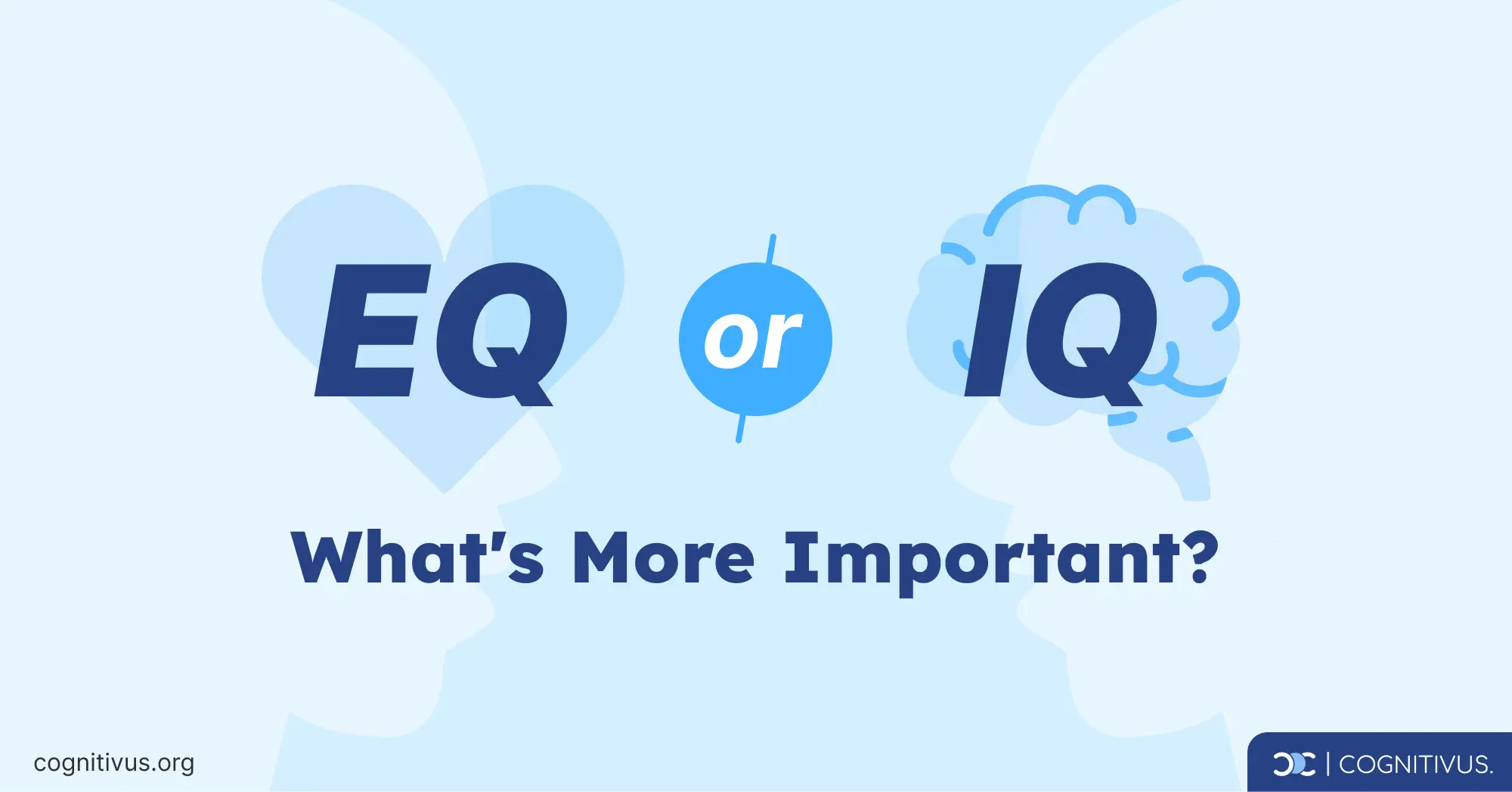Imagine you’re in a heated debate during a family dinner, and your cousin suddenly says something controversial that you disagree with. You have two options: you can use your Emotional Intelligence (EQ) to stay calm, understand their perspective, and respond with empathy or you can use your Intelligence Quotient (IQ) to present logical arguments and evidence to support your viewpoint.
Both EQ and IQ are highly valuable and knowing when to tap into each can really improve our interactions and overall effectiveness in both personal and professional settings.
In this article, we’ll explore whether EQ or IQ holds more importance in various situations you may encounter.
1. Introduction to IQ
What’s IQ or Intelligence Quotient?
IQ, or Intelligence Quotient, measures your cognitive abilities through standardised tests. It gauges your ability to solve problems, analyse data, and understand complex ideas. People with high IQs, like scientists and engineers, often excel in fields that demand sharp analytical skills and logical reasoning. IQ is used to assess academic abilities and to identify individuals with exceptional intelligence or mental challenges.
A brief history of IQ
The concept of IQ was first introduced by French psychologist, Alfred Binet, in 1905. He developed the Binet-Simon scale to help identify students needing educational assistance. Although Binet's original test was designed to identify children who needed extra academic help, it quickly turned into a tool for identifying and labeling some children as "feeble-minded". American psychologist, Lewis Terman, later revised this test in 1916 into the Stanford-Binet Intelligence Scale, which became a standard method for measuring intelligence in the United States. Initially, IQ scores were calculated by dividing a person’s mental age by their chronological age and multiplying by 100.
How is IQ measured?
Today, most IQ tests scores are calculated by comparing the test taker's score to the average scores of other people in the same age group. Commonly used IQ tests include:
- The Stanford-Binet Intelligence Scale
- The Wechsler Adult Intelligence Scale
- The Wechsler Intelligence Scale for Children
- The Woodcock-Johnson Tests of Cognitive Abilities
- The Differential Ability Scales
These tests measure various abilities such as visual and spatial processing, knowledge of the world, fluid reasoning, working memory, and quantitative reasoning. Generally, a score of 100 is considered average, while scores above 130 are considered superior, and scores below 70 may indicate cognitive challenges.
2. Introduction to EQ
What’s EQ or Emotional Quotient?
EQ, or Emotional Quotient, measures your emotional intelligence. Understanding and managing your own emotions, while empathizing with others, is key. EQ involves empathy, self-regulation, and the ability to uplift those around you. It is the capacity to categorise various emotions and use emotional cues to shape decisions and actions.
A brief history of EQ
The concept of Emotional Intelligence was first introduced in the 1990s by researchers Peter Salovey and John Mayer. They defined it as “the ability to monitor one's own and others' feelings and emotions, to discriminate among them and to use this information to guide one's thinking and actions”. However, it was popularised by Daniel Goleman’s 1995 book "Emotional Intelligence: Why It Can Matter More Than IQ," which brought the term into the mainstream, especially in business and educational contexts.
How is EQ measured?
There are several different assessments that can be used to measure EQ. Some are self-report tests, where individuals respond to questions about their own feelings, thoughts, and behaviours, while others involve observer ratings from people who know them well. Common EQ tests include:
- The Mayer-Salovey-Caruso Emotional Intelligence Test (MSCEIT)
- The Emotional and Social Competence Inventory (ESCI)
- Self-report Intelligence Questionnaire (TEIQue)
- Bar-On Emotional Quotient Inventory
There are also many online self-assessments available, and while these tests can provide a general idea of a person’s emotional abilities, they are not usually considered diagnostic tools. Typical EQ assessments rank abilities in areas such as self-awareness, self-regulation, motivation, empathy, and social skills.
3. Is EQ More Important than IQ?
The answer isn't quite so straightforward as both EQ and IQ are crucial in different contexts.
Where IQ matters more than EQ
IQ shines in roles that demand logical-mathematical intelligence, like in STEM fields and strategic positions. A high IQ helps individuals excel academically and professionally by providing the tools to analyze problems and craft innovative solutions.
Examples of where IQ is more important:
- Scientific research and engineering: Scientists and engineers need to understand complex theories, conduct experiments, and solve intricate problems. Their ability to process large amounts of information and apply logical reasoning is critical.
- Data analysis and statistics: Analysing data sets to find patterns, making statistical inferences, and applying mathematical models require high IQ.
- Software development: Coding, debugging, and creating complex algorithms demand strong problem-solving skills and technical knowledge.
- Academic exams and standardized tests: High IQ correlates with better performance on standardized tests (GRE, SAT, LSAT, GMAT, etc) and academic assessments, which often focus on logical reasoning and knowledge retention.
- Strategic planning: Developing long-term business strategies, making financial forecasts, and managing large-scale projects require the ability to think abstractly and plan effectively.
Where EQ matters more than IQ
As well as IQ, research is revealing that emotional intelligence is becoming just as crucial as traditional intelligence. For example, in the modern world, workplaces now value social finesse and adaptability, making high-EQ individuals essential for collaboration and decision-making. So, EQ has become increasingly recognised and vital in today's world.
Daniel Goleman, the leading figure in EQ research, emphasises the importance of social skills and understanding team dynamics. He believes that emotional intelligence is crucial for success. According to some research, estimates indicate that emotional intelligence makes up about 80% of it, while other estimates, such as the one provided by Travis Bradberry in Forbes, put it at 58%. In both cases, EQ is believed to be more important than IQ.
It’s therefore no wonder that employers highly value EQ. The University of Southern California recently highlighted that EQ is taking centre stage in hiring and leadership development due to its vital role in collaboration and decision-making. EQ is also a crucial skill for leaders. According to Daniel Goleman, the most successful leaders distinguish themselves through their emotional intelligence – their ability to identify and manage their own emotions as well as those of others.
Examples of where EQ is more important:
- Leadership roles: Leaders must inspire and motivate their teams, manage stress, and resolve conflicts. Leaders with a strong EQ understand their team members’ emotions and foster a positive work environment.
- Sales and customer service: Understanding customer needs, handling objections, and building rapport are crucial. High EQ helps in empathizing with customers and providing excellent service.
- Human resources: HR professionals deal with hiring, training, and managing employee relations. They need to navigate complex interpersonal dynamics and support employee well-being.
- Counselling and therapy: Therapists and counsellors must understand and manage their clients’ emotions, provide empathetic support, and create a trusting environment.
- Team collaboration: In collaborative projects, understanding team dynamics, communicating effectively, and managing group emotions lead to better teamwork and productivity.
4. The Relationship between IQ and EQ
Although IQ and EQ represent distinct aspects of human intelligence, emerging evidence suggests a relationship between the two constructs; That relationship can be complex and sometimes contradictory.
A study on medical interns, for instance, as published in the Open Journal of Psychiatry & Allied Sciences, found that males generally had higher IQs but lower EQs, whereas females showed the opposite pattern. This gender difference shows that IQ and EQ vary between individuals. It highlights the need to develop both for better job performance and personal well-being. Interestingly, the study found that higher EQ in females linked to lower academic performance, while higher IQ in males linked to better academic performance. This illustrates the complex relationship between IQ and EQ.
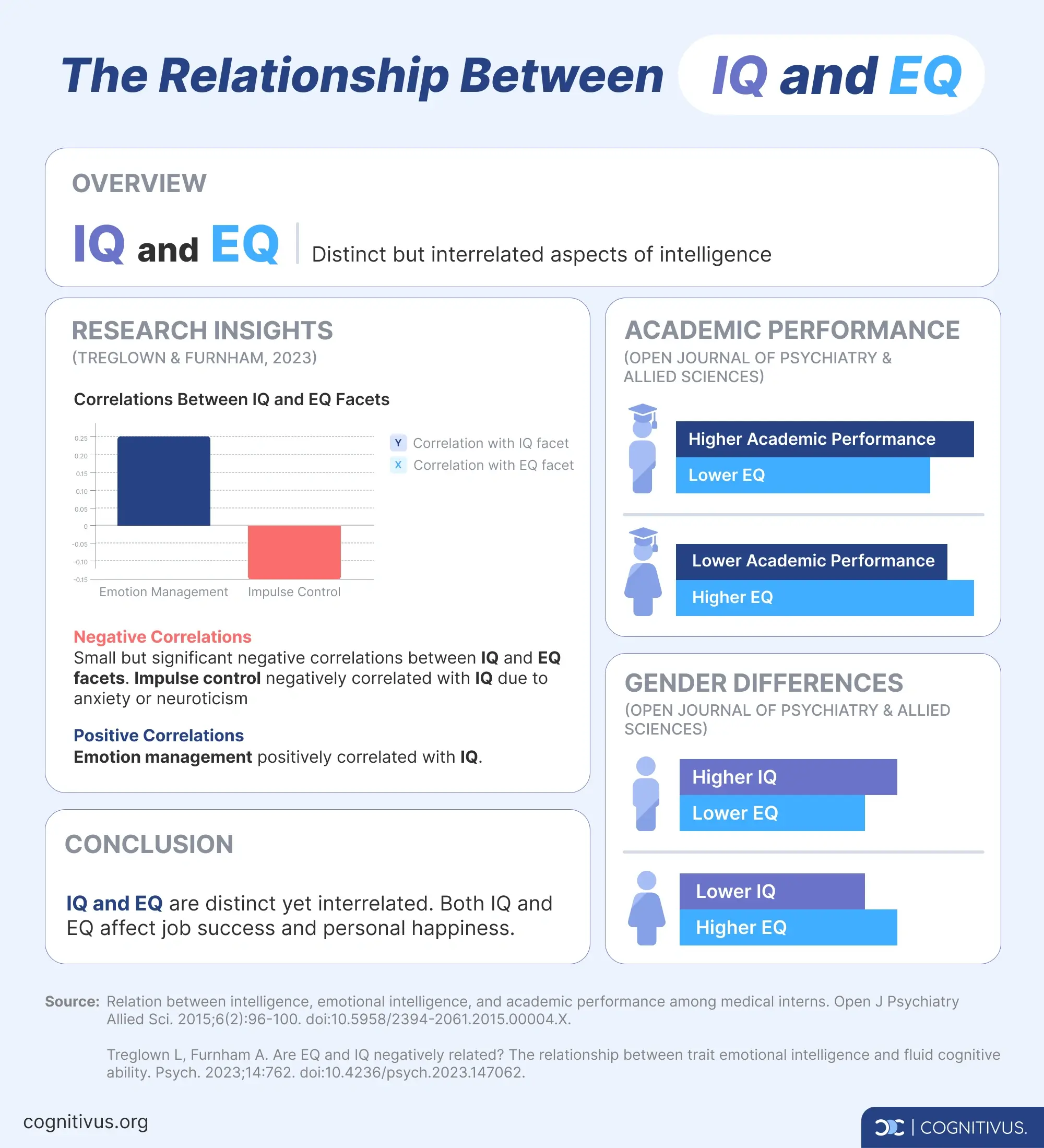
Similarly, research by Treglown and Furnham (2023) involving over 6,000 adults reported small but significant negative correlations between various facets of IQ and EQ. Certain aspects of EQ, like emotion management, positively correlated with IQ, while traits like impulse control negatively correlated with IQ. This means that higher IQ would be associated with better emotional management skills, but poor impulse control due to anxiety or neuroticism.
While these findings suggest that IQ and EQ are different, they are intertwined in ways that can make huge impacts on our lives.
5. Can EQ or IQ be Improved?
Balancing IQ and EQ can truly make the difference between being good and being great. Those who master both are often the most successful. They are able to combine sharp thinking with emotional wisdom to excel in both work and life.
You can develop both EQ and IQ by recognizing their complementary nature. EQ involves understanding emotions, while IQ focuses on logical reasoning. Let’s see how to improve each side.
How to improve EQ
EQ can be improved at different stages of life:
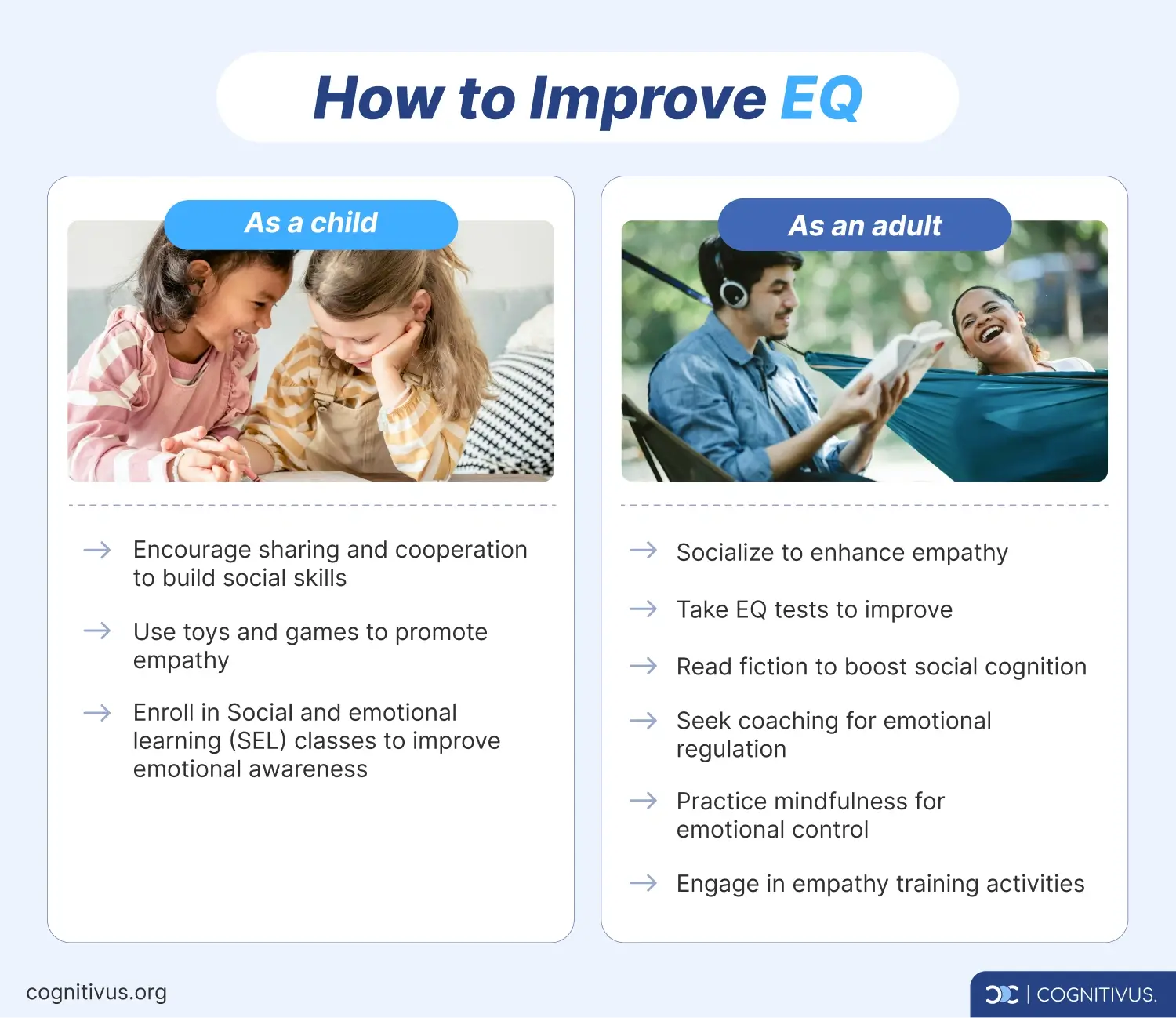
Early childhood development
Starting young can have a lasting impact on a child's emotional intelligence. Here are some strategies to help children develop strong EQ:
- Encourage qualities like sharing and cooperation: Teach children to think about others and work well in group settings.
- Use toys and games: Engage children with games that promote empathy and emotional understanding.
- Social and emotional learning (SEL) classes: These classes have been shown to significantly improve children's social skills and emotional awareness.
Adult development
- Start by socializing more: Engaging with different people helps improve your social skills and empathy. This strengthens your EQ by making you more aware of others' emotions.
- Take EQ tests: Regularly assessing your emotional intelligence helps you identify areas for improvement, encouraging growth in understanding and managing emotions.
- Reading: Research shows that reading fiction can improve social-cognitive abilities by activating brain networks associated with the theory of mind. Immersing yourself in the experiences of others, whether real or fictional, can improve your social thinking skills and empathy.
- Effective coaching: Seek coaching or therapy to develop better emotional regulation and interpersonal skills.
- Mindfulness practices: Engage in mindfulness and meditation to enhance emotional awareness and control.
- Empathy training: Participate in activities or workshops designed to foster empathy and improve social skills.
How to improve IQ
While genetics play a significant role in determining IQ, certain activities can help maximise one's cognitive potential:
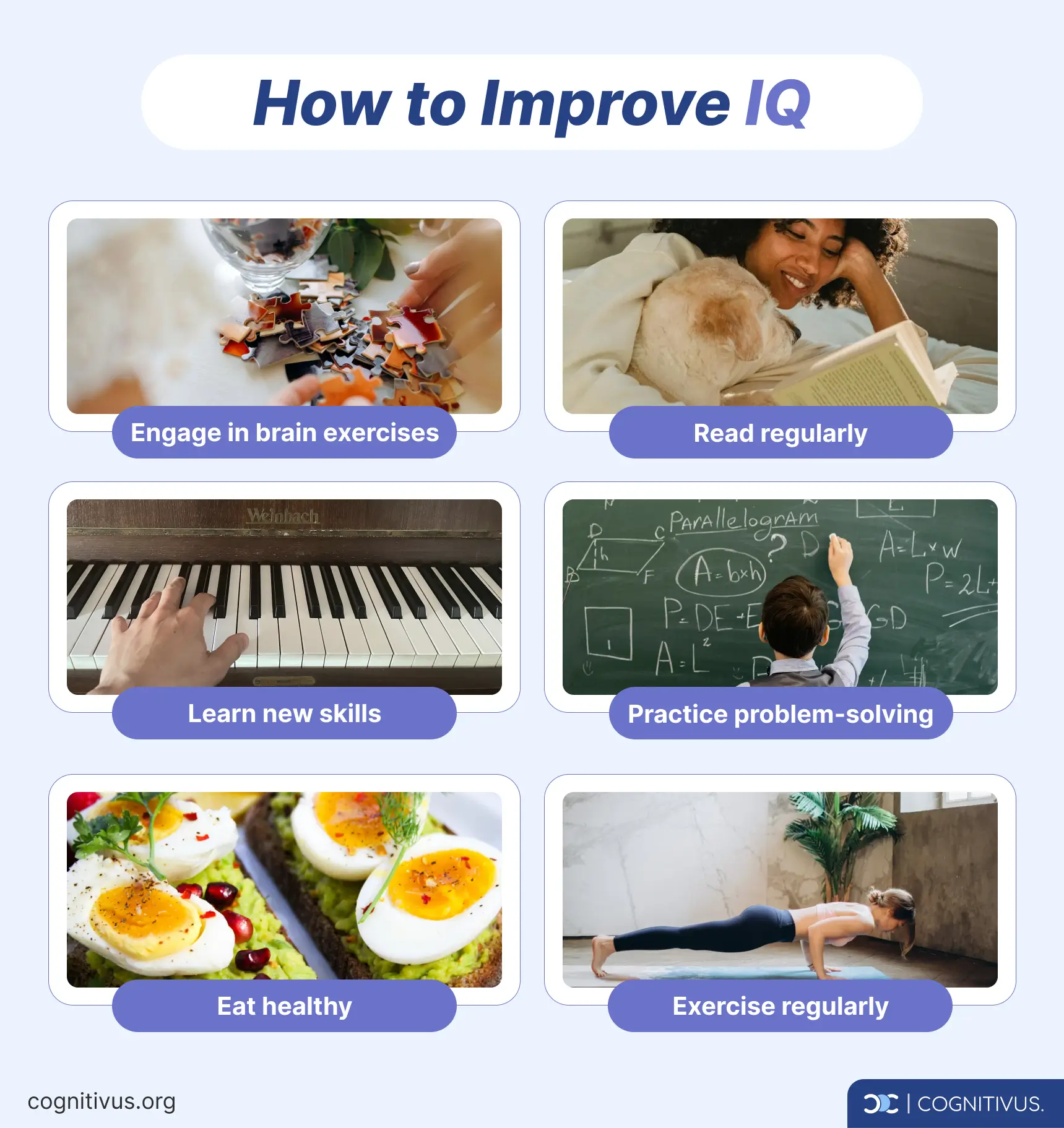
- Brain exercises: Engage in activities that challenge the brain, such as puzzles, crosswords, and strategy games.
- Reading: Studies show that reading ability can positively impact general intelligence over time. So, as we’ve seen, reading is a good way to boost both EQ and IQ.
- Learning new skills: Take up new hobbies or learn new subjects to keep the brain active and flexible.
- Problem-solving techniques: You can practice logical reasoning and critical thinking through exercises designed to improve cognitive functions.
- Healthy lifestyle: Through maintaining a balanced diet, regular physical exercise, and adequate sleep, you can support overall brain health.
7. Are There Other Types of Intelligence That Matter?
Yes, there are many types of intelligence beyond IQ and EQ that are important. Psychologist Howard Gardner's theory of multiple intelligences highlights several other forms, each important important in its own way:
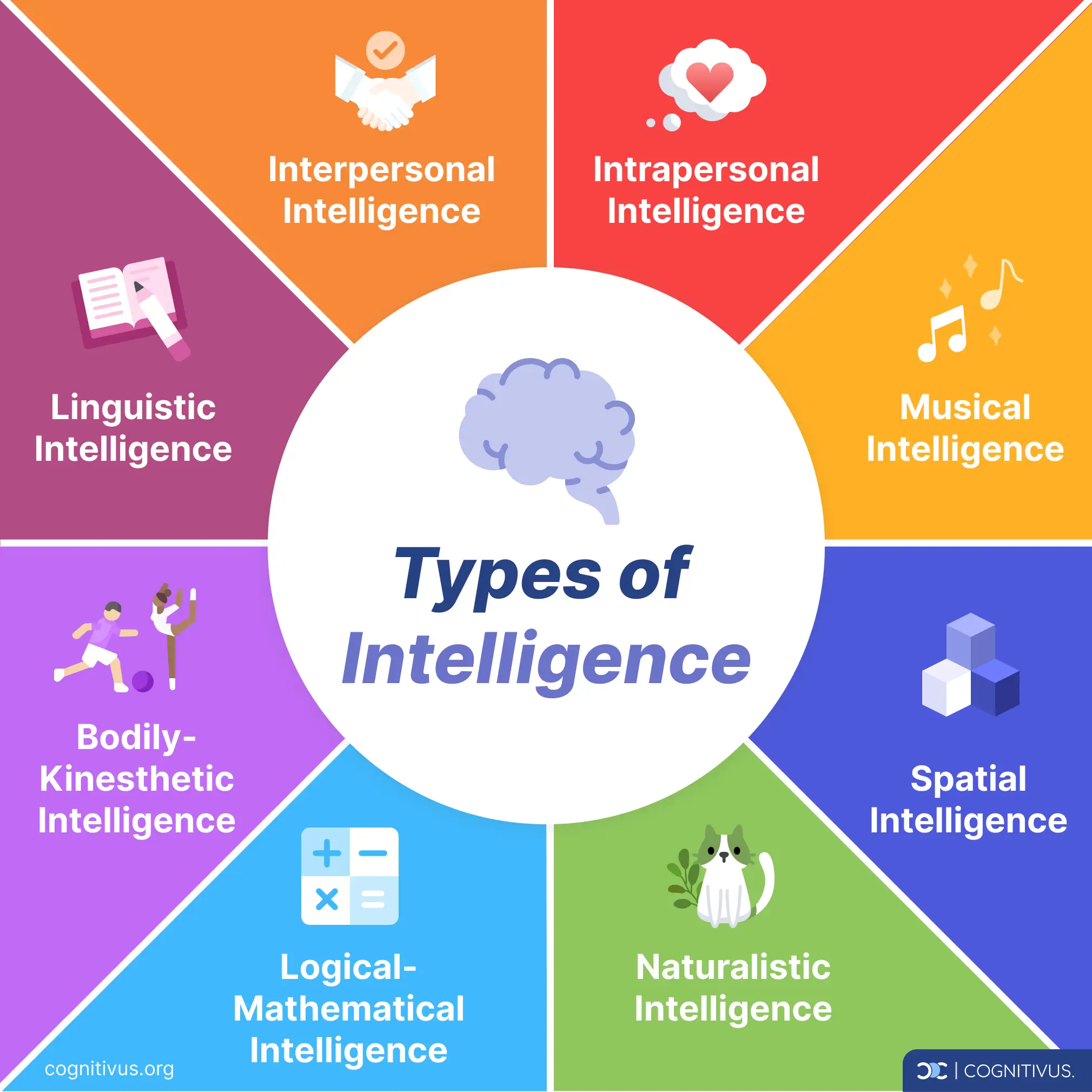
- Linguistic Intelligence: This is key for writers, speakers, and educators as it enables effective communication and articulation of ideas.
- Logical-Mathematical Intelligence: Think of scientists, engineers, and analysts. It underpins problem-solving, logical reasoning, and mathematical skills.
- Spatial Intelligence: Important for architects, artists, and designers. It involves visualizing and manipulating objects in space.
- Musical Intelligence: If you’re a musician, composer, or music therapist this is highly valuable. It’s about understanding and creating musical patterns. We should also note that there is a proven connection between music and IQ.
- Bodily-Kinesthetic Intelligence: Key for athletes, dancers, and surgeons since it entails using one's body effectively for movement and coordination.
- Interpersonal Intelligence: Critical for leaders, therapists, and teachers. It involves understanding and interacting effectively with others.
- Intrapersonal Intelligence: If you’re into personal growth and self-reflection this helps to understand oneself and regulate one’s own life.
- Naturalistic Intelligence: Useful for biologists, conservationists, and outdoor educators; it involves recognising and categorizing plants, animals, and other aspects of nature.
While Gardner’s theory doesn’t explicitly categorize IQ and EQ, they are related concepts.
On one hand, IQ (Intelligence Quotient) primarily encompasses logical-mathematical and linguistic intelligences. It focuses on problem-solving, reasoning, and understanding complex ideas.
On the other hand, EQ (Emotional Quotient) closely aligns with interpersonal and intrapersonal intelligences. It emphasizes emotional awareness, empathy, and self-regulation.
Each type of intelligence plays a significant role depending on the context. For example, a leader with high interpersonal intelligence can inspire and manage a team effectively, while a scientist with strong logical-mathematical intelligence can excel in research and innovation.

